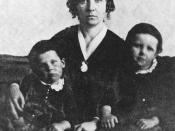Post-bellum America experienced a shift from a rural, agrarian society to an urban, industrial society which caused a conversion in the way families functioned, forced Americans and immigrants alike to adjust to the unsympathetic factory system, and gave career opportunities to women for ages to come.
Born in the country, America moved to the city in the decades following the Civil War. As agriculture deteriorated in relation to manufacturing, America could no longer aspire to be a nation of small freehold farms. Industrial jobs, above all, drew country folks off the farms and into factory centers. From 1950 to 1900, the percent of the labor force involved in manufacturing increased from 16.4 percent to 27.5 percent. The relocation to the city introduced Americans to dissimilar ways of living. In rural areas, dwellers produced little household waste. Domestic animals or scavenging pigs ate food scraps on the farm. Household products were sold in bulk at the local store, without wrapping.
In the city, however, goods came in throwaway bottles, boxes, bags, and cans. Apartment houses had no adjoining barnyards where residents might toss garbage to the hogs. The new urban environment was hard on families. Paradoxically, the crowded cities were emotionally isolating places. Urban families had to manage on their own, separated from the clan, kin, and village. As families increasingly became the virtually exclusive arena for intimate companionship and for emotional and psychologically satisfaction, they were subjected to unprecedented stress. Many families cracked under the tension. The urban era launched the era of divorce. From the late nineteenth century dates the beginning of the "divorce revolution" that transformed the United States' social landscape in the twentieth century. Urban life also dictated changes in work habits and even in family size. Not only fathers but mothers and even children as young...


